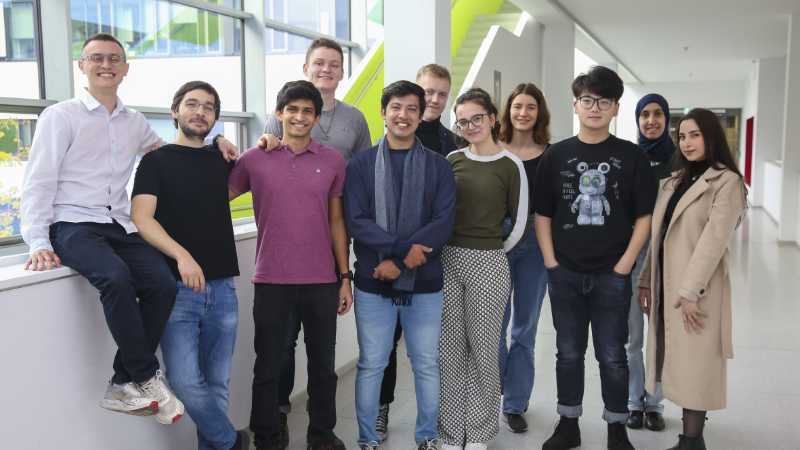
Master of Science in Physics of Life
Modern biophysics – from molecules to organisms

Which equations determine the motion of molecules in an organism?
How do cells generate and distribute energy to keep themselves alive?
What makes tissues deform into distinct shapes when an embryo evolves?
How can we measure the forces in cells and tissues?

Biological Physics combines the power of physics and the complexity of biological systems. If you enjoy applying mathematical models and physical principles, then this field opens the door for you to cutting-edge research at the intersection of multiple disciplines including physics, biology, chemistry, and medicine. The international Master of Science in Physics of Life provides a unique opportunity to learn how to solve exciting real-world biological problems through a physicist’s lens.
If you are intrigued by the “how” and “why” of life at a fundamental level – how proteins fold, how cells communicate, or how organisms develop – Biological Physics provides a versatile platform to explore these questions in detail, using the rigorous, quantitative methods of physics. From addressing modelling of pandemics to designing bioengineered tissues, the field of Biological Physics has an immediate and long-term impact with ample opportunities inside and beyond academia.
By combining computational models and experimental techniques, you will learn how to tackle open problems in biophysics from different angles. Through lab courses and rotations, programming tutorials, and a research-oriented Master thesis, you will gain first-hand research experience.
Specialization tracks
Starting from the 2nd semester, students will choose one of three sub-tracks
- Experimental Biological Physics
- Theoretical Biological Physics
- Nanobiotechnology
by taking dedicated specialization courses.
In addition, a core curriculum of common courses will provide a solid foundation for all students irrespective of their chosen track, which will be crucial for future cross-disciplinary research work. The core modules will cover the following topics
- Nonlinear dynamics and statistical physics, physical chemistry and thermodynamics, polymer physics
- Experimental methods & design, stochastic processes
- Fluid mechanics, elasticity theory, hydrodynamics of active living matter, pattern formation in biology
- Programming & image analysis
- Molecular biology, cell and tissue biology, mechanobiology, and developmental biology
- Introduction to nanobiophysics and cellular machines
Syllabus
| 1st Semester | 2nd Semester | 3rd Semester | 4th Semester | |
|---|---|---|---|---|
| Core Modules | Introductory Biological Physics | Advanced Biological Biophysics | Pattern Formation and Active Matter Hydronamics | Master Thesis |
| Physical Chemistry and Experimental Methods | Research Lab Projects | |||
| Statistical Principles and Experimental Design | ||||
| Molecular Biology and Biochemistry of Cells and Tissues | ||||
| Elements of Nanobiotechnology | ||||
| Specialization Modules | Specialization Experimental Biological Physics | |||
| Specialization Theoretical Biological Physics | ||||
| Specialization Nanobiotechnology | ||||
Why Study and Work in Dresden? A High-End Research Hub at an Affordable Cost
- Exceptional Student Life: Explore a vibrant cultural scene, stunning architecture, river landscapes, and affordable living—all in a city that balances academic excellence with personal well-being.
- Career Opportunities: From microelectronics to biotech, students benefit from research-to-industry pipelines, internships, and a thriving start-up culture driven by local innovation centers.
- Affordable Living: In Dresden, a shared student apartment costs on average €350/month (2025). By comparison: Berlin: ~€650/month, Munich: ~€800/month, (Sources: Moses Mendelssohn Institute, WG-Gesucht, UniRents, IamExpat, meinbavaria.de)
- International Campus: TU Dresden hosts around 29,000 students, with approximately 18.5 % international students (Dec 2023). This multicultural environment fosters global connections and offers opportunities to learn German alongside locals.
- Rich Academic Landscape: With 121 degree programs—including Bachelor’s, Master’s, Diplom, and Staatsexamen—TU Dresden is a University of Excellence since 2012, partnering with over 25 major research institutions such as the Max Planck Society, Fraunhofer Society, Helmholtz, and Leibniz.
- Strong Industry and Innovation Network: Dresden is at the heart of Silicon Saxony, Europe’s largest microelectronics and ICT cluster, with more than 600 member companies including Infineon, GlobalFoundries, Bosch, X-FAB, NXP, ASML, and Applied Materials.
- The BioInnovationszentrum Dresden (BioZ) hosts TU Dresden’s Biotechnology Center (BIOTEC) alongside biotech start-ups and research groups—enabling “science and industry under one roof” and fostering biotech innovations.
see also our Life in Dresden page